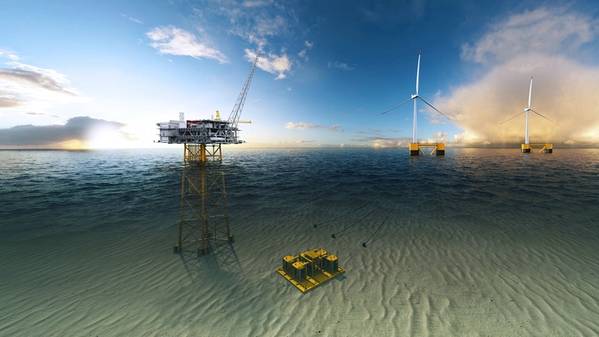
Sian Lloyd-Rees, UK country manager with Aker Solutions and and chair of the Low Carbon Future keynote program session at SPE Offshore Europe 2019, believes oil and gas companies should lead the way toward a lower carbon future. Energy diversification, she says, is key.
The oil and gas industry is perhaps one of the most important allies for diversification into renewable energy and other energy sources. The sector generates significant levels of cash flow and boasts infrastructure networks that span the globe. While there has been intriguing and impressive innovation and investment activity in this space, the industry is just tapping the edge of the potential that energy diversification offers.
Some oil and gas companies have already made significant progress in this area. For example, Aker Solutions’ investment in offshore floating wind company Principle Power Incorporated last year signals a confident move towards unlocking potential for offshore wind power generation, both in terms of power to grid, and power to platform/subsea. Likewise, major operators have evaluated opportunities for energy diversification and are actively leading in this space. From investments in solar energy and bioenergies, to linking pay for top executives to the achievement of emissions targets, there are many new initiatives driving us towards a lower carbon future.
Evolve to solve
Put simply, the industry must act in order to strengthen its focus on low carbon and sustainable solutions. The challenge or rather, the opportunity, that we face is how we can use all of this to underpin and drive our sustainable evolution.
The industry must work much more closely and with more transparency than it ever has before. We need continued pressure to center our technology development and strategies around sustainable motivations – whether that be reducing the carbon footprint of our own, existing operations; developing new technology that tackles carbon emissions, or even technology and services that take us into alternative energy production.
Traditional oil and gas companies can, and should, take the lead. We already have the infrastructure, the track record and the talent to make it a reality. Arguably, the companies who make the leap first will learn quickly to overcome the challenges and reap the earliest rewards.
After a tough few years, intelligent solutions, digitalization and cost optimization have never been more crucial. We can now utilize all of these tools and learnings to develop low carbon solutions and enable the energy transition.
One example is the transition to electrification to decarbonize our industry’s operations. First, it connects our products and makes them more intelligent, providing new levels of insight into the performance and condition of our equipment. Secondly, it makes existing products and equipment smaller and lighter, thereby reducing operational infrastructure which not only reduces the cost of manufacture and installation, but also reduces carbon footprint.
Competition in this prospering arena will attract investment and accelerate innovation. By broadening and diversifying our capabilities and galvanizing our green credentials, we are better positioned to offer more for our customers, employees and suppliers. We can become a more dynamic and disruptive sector which can recruit and retain the best talent and skills.
Running a business with a clear sustainability mandate makes the industry more interesting and gives us that economic and environmental edge.
A low carbon future
To achieve stringent climate change goals, we are going to have to think, and act, differently. It’s not enough to make small adjustments – meeting the targets of the Paris agreement will be a huge endeavor and will require the industry to work in new ways, develop new technology and foster a new mindset.
We’re not starting from scratch in this regard. As an industry, we’ve made some great (albeit required) steps forward with collaborative working, cross-industry learning, standardization and operational optimization. We need to strengthen our focus, and get the industry’s support, to mature existing and develop new technologies.
In the lead-up to mid-century, industry analysts predict the world will operate a broader energy mix, but it will still require a significant amount of oil and gas production. We have a responsibility to the communities we operate in to take a sustainable approach to this demand. Oil and gas can become the platform from which to enable the energy transformation, and the switch to a lower carbon future.
A platform for change
The growing and tangible focus on the energy transition and the oil and gas industry’s role in the energy mix will be showcased at the ‘Low Carbon Future’ keynote session at this year’s SPE Offshore Europe conference and exhibition in Aberdeen, UK. Leaders, academics and innovators from within and beyond the boundaries of oil and gas will explore the challenges, opportunities and technical, social and economic prizes for companies willing to take a leading position in energy diversification.
The focus and fervor to improve the sustainability of our industry is critical and will be a hot topic at SPE Offshore Europe 2019. It’s an event that encourages people to engage and take knowledge and insight back to their businesses and change or adapt appropriately.

With a career spanning over 25 years, Sian Lloyd-Rees has held a number of leadership roles in both blue chip and start-up companies. She joined Aker Solutions in 2014 to lead the strategy, marketing and business development functions for Aker Solutions across the Europe and Africa region. In her current role, Sian, with her UK leadership team, is committed to growing the company’s operations in the country, with a focus on increasing front end, early customer engagement and developing a world class services business. She will chair the Low Carbon Future keynote program session at SPE Offshore Europe 2019.